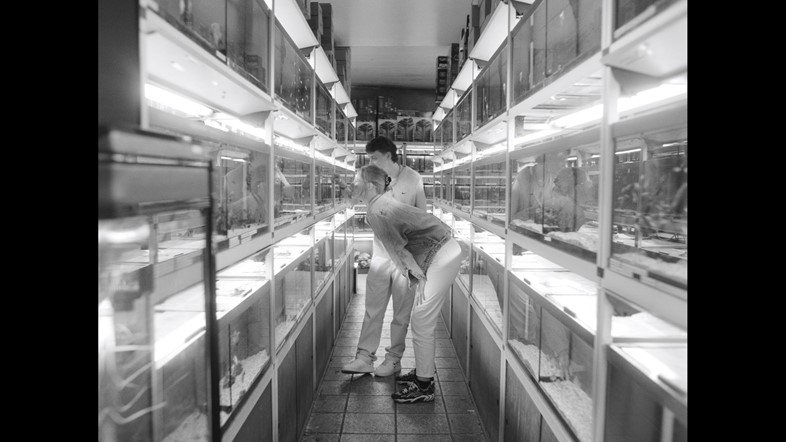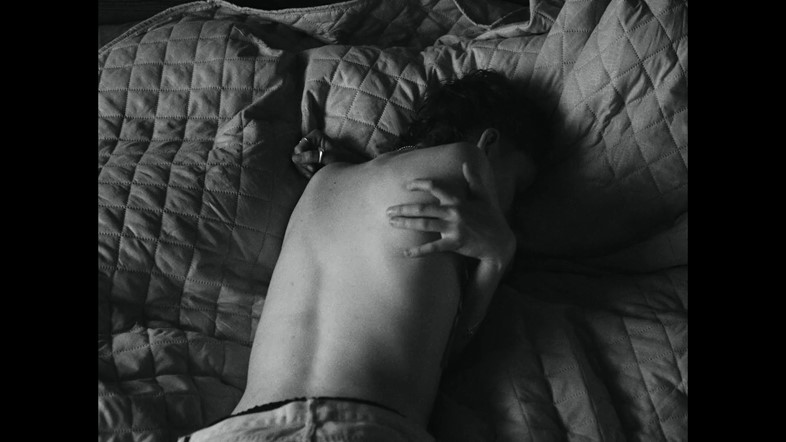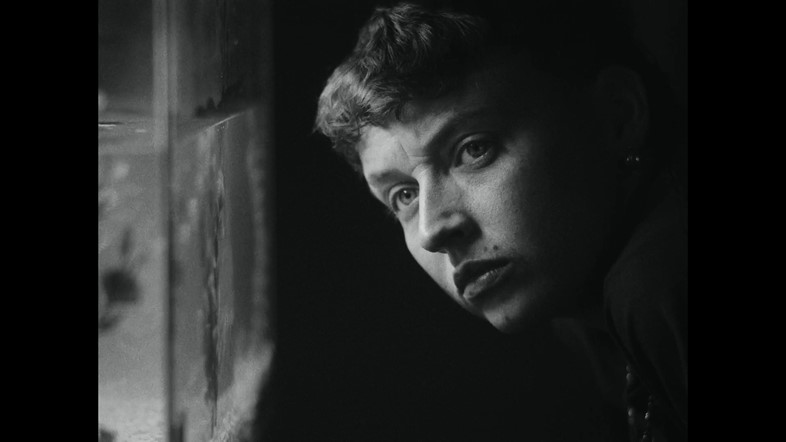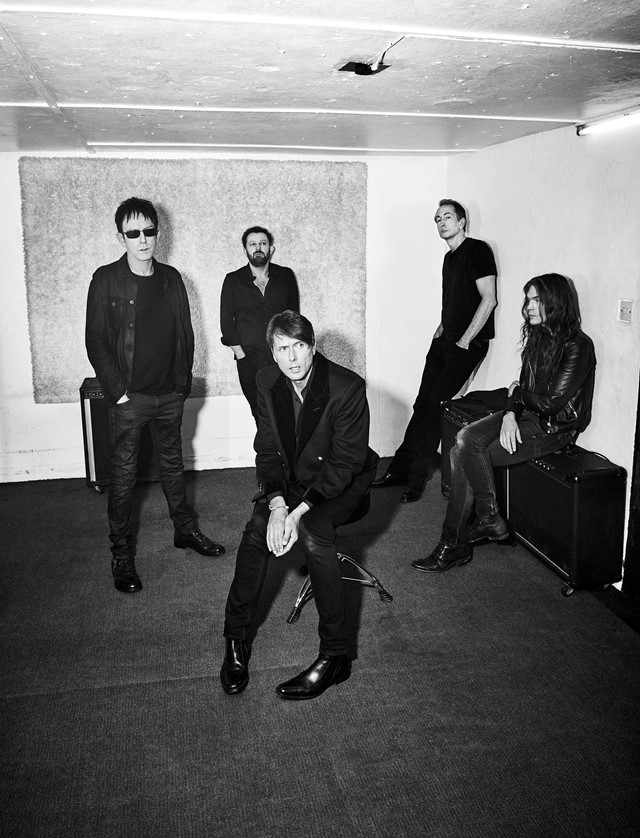“The Suede universe has always been a little bit tatty, a bit grubby, and a bit kitchen sink, I suppose,” says Suede frontman Brett Anderson as the legendary band premiere their new short film, Autofiction
From their first incursion into the dire, baggy landscape of the UK Top 40 in 1992, Suede heralded a renaissance of androgynous glamour undercut by the vicious, potent pop of early singles like Metal Mickey and Animal Nitrate. Casting an alluring spell on the detritus of everyday life … broken bicycles, paracetamol, and “chasing round in stole ice cream vans”, they offered an enticing invitation to join them in what the band’s bass player Mat Osman describes as their “slightly grubby, ambiguous, obsessive world”.
Over the following three decades, this world continued to expand exponentially. “It’s difficult to pin down what a Suede sensibility is because I don’t want to limit it by saying it’s one kind of thing,” singer Brett Anderson explains in a conversation on Zoom. “We’re constantly moving the fences slightly further out, to make the field bigger and incorporate more and more into the Suede universe.” Through subsequent albums, from the grand, haunting melodrama of Dog Man Star (1994), to their irresistible, era-defining Coming Up (1996), and the orchestral countryside-noir of their most recent album The Blue Hour (2018), Suede has continued to accumulate ever more beautiful and compelling music and lyrical imagery with which to chart the topography of the peculiarly romantic terrain over which they preside.
Their upcoming ninth album, Autofiction strips back their sound to something more essential and immediate. “For Suede, it’s really important every couple of years to almost burn everything down and start again,” Osman says. “So it’s just a really straightforward rock and roll record. But that also means there’s nowhere to hide … no orchestras or click tracks or overdubs, you can hear every note everyone plays.”
To accompany its release, the band has collaborated with director Katie Lambert on a short film which takes its inspiration from the spirit and atmosphere of the new record. Unlike most music promos, the band themselves are incidental – its narrative centers instead on a queer couple at a pivotal moment in their relationship. Hannah (Hannah Higton) and Chris (Noah Granville) have an argument before reuniting at a Suede gig. We see the slippage between truth and memory by experiencing the conflict twice, played out through the eyes of each protagonist. Like everything Suede touches, the film is permeated with a sense of ambiguity.
Having published two autobiographical books in short succession (Coal Black Mornings in 2018 and Afternoons With the Blinds Drawn the following year), the amorphous concept of objective truth and its relationship with artifice is something that particularly fascinates Anderson. “All art is a mixture of memoir and fiction – everything sits at a point on that spectrum,” he says. “Our memories are like increasingly Xeroxed versions of themselves.”
To celebrate the premiere of Autofiction: A Short Film we speak to director Katie Lambert and Suede’s Brett Anderson and Mat Osman about their collaboration, retaining a sense of ambiguity, fandom, the curious authenticity of artifice, and much more.

Katie Lambert
“I guess the film, for me, is about growing up and taking responsibility as an adult. It’s really centred around having been with somebody for a while and reaching the ‘is this it?’ moment. Chris and Hannah are exploring their anxiety around these concerns. In really broad strokes, it’s about the breakdown of their relationship or, at least, the moment where that starts to happen.
“It’s also about music. They were best friends and they used to go to Suede gigs together. And now they’re older, as a couple, that music remains an important thing for them. Hannah’s like, ‘It’s our band!’ They’ve had all these shared experiences soundtracked by Suede.
“I wanted to pose a question in the film that it doesn’t necessarily answer. Should they stay together? Will they have a child?” – Katie Lambert
“The band came with the basic ideas and I just made it very personal to me. The characters both have elements of me in them, but they are also based on people I know. I’m 31 and I have a lot of feelings about questions like, ‘Should you have a child now?’ Or, ‘Is this my person?’
“They have inverse emotional journeys, almost. At first, Chris seems like they’re not really into the relationship – I’m sure we’ve all had it, that moment of wavering. And then there’s the line in the film when they realise, ‘I can’t move for memories of you.’ I think that’s Chris’s journey of realising that they are actually very much in love with Hannah; that Hannah is still their person. And then Hannah’s journey is kind of the opposite. I think she’s realising that perhaps she doesn’t trust the future that they would have together.
“I wanted to pose a question in the film that it doesn’t necessarily answer. Should they stay together? Are they going to stay together? Will they have a child? I have my opinion of that but it doesn’t matter. And I definitely don’t want the film to give an opinion of what’s the right thing or the wrong thing. Maybe they are perfect together. Or maybe they could both find better love somewhere else. Who knows, no one can tell.”

Brett Anderson
“The Suede universe has always been a little bit tatty, a bit grubby, and a bit kitchen sink, I suppose. I was brought up in a little council house with a kind of dump at the end of the road. A lot of imagery in Suede’s songs is a reflection of that world which, in many ways, I don’t seem to ever be able to escape. But I’ve always found a kind of romance in that world and the film reflects that, to a certain extent.
“We thought it’d be quite a bold idea to make a band film which is essentially a promo but the band aren’t the main focus. Normally with a conventional promo, the band are at the centre and the camera’s up your nose the whole time and you’re prancing around. The crowd are usually incidental, just a sea of faces to provide a backdrop. I thought it would be much more of an interesting inversion if we focused on the actual lives of people in the crowd and the band were more incidental.
“The film is a homage to our fans, if that doesn’t sound too grandiose. It’s about getting into their world rather than ours. There’s a song on the new album called What Am I Without You? and it asks the question that every artist must eventually ask themselves: ‘What am I artistically without an audience?’ There’s that cliche that gets trotted out about artists making music for themselves and if anyone else likes it, then that’s a bonus. I think that’s a load of bollocks. As a band, you need an audience because art is an act of communication. You’re asking a question artistically and the audience answers that question. It’s almost like that idea of if a tree falls down in the forest and no one’s there to hear it, did it really happen?
“As a band, you need an audience because art is an act of communication. You’re asking a question artistically and the audience answers that question” – Brett Anderson
“Their stories of the two people in the film are fictionalised, but, in a funny sort of way, that doesn’t make it less true. You know, fiction can have a truth to it as well. I like the idea that fictional landscapes aren’t necessarily artificial. A memoirist, say, might think that everything they’re writing is 100 per cent the ugly truth, but they’re still editing it and choosing what to leave out, they’re still manipulating the truth, whether they like it or not. And so, creating characters in order to tell truths, I think, is a perfectly valid thing to do. The new album’s called Autofiction and the idea is that all art is auto-fiction – everything sits at a point on that spectrum between memoir and fiction. Even the most fictional thing that you can imagine, let’s say, Lord of the Rings, it’s not totally fiction. Even with the wizards and all these fantastical elements, it still contains human truths.
“Our memories are like increasingly Xeroxed versions of themselves. It’s something that happens when you get older … reminiscing and thinking about youth. I wrote a book [Coal Black Mornings] a couple of years ago that was a lot about my childhood and it took me down a really important path. I loved writing it because I was able to order a lot of thoughts about my childhood and my parents. I find writing about family and remembering the person I used to be really important. It fascinates me. It’s almost like this collection of Russian dolls and the latest version is just the outside Russian doll. If you keep digging inside, there are all these different versions of yourself down to the toddler and the baby almost, and they all have an equally valid claim to being called you.”

Mat Osman
“People’s relationships are always unknowable unless you’re inside them, so we wanted to make a film that wasn’t too clear cut, that wasn’t too straightforward. More than anything, it’s about taking quite a simple story – two lovers have a fight, and then meeting again at a gig – and seeing how you could explode that out. Seeing the same things through two sets of eyes, there are lots of questions it brings up about truth and memory, the way these little things that mean nothing to one person mean the world to someone else. I’m bored nowadays if I really know exactly what’s going on in films. I much prefer it if there is some ambiguity and if you’re not sure whose viewpoint is true and what it actually means.
“In the song 15 Again [which appears in the film], there’s that sense of being a teenager and I think it’s captured that really well when the young Chris says to young Hannah, ‘We’re the kings of this place!’ It’s like having this terrible mix of supreme self-confidence and absolute terror. Brett's a writer who will never write about pure joy without there being some darkness underneath and vice versa. He very rarely writes about despair without a chink of light, but that’s what life is, isn’t it? Nothing’s ever 100 per cent one thing. So it’s the ambiguity of feelings, as well as the ambiguities of stories.
“We wanted the film to not so much be about the band but about the effect that they have; to convey that sense of the way that music winds its way in and out of people’s lives” – Mat Osman
“Film has always been important to us. We worked with Derek Jarman right on the first record. And when me and Brett were forming Suede, films like Performance (1970) and Mike Leigh’s Meantime (1983) were so essential in the idea and the look of it. When I was first getting into music, I always loved when bands had this huge culture around them and they introduce you to films and thinkers, artists and photographers. I didn’t have an older brother or sister and I didn’t really know anyone who was into cinema or anything outside the mainstream. So my educators were people like David Bowie, he’s where lots of my tastes in literature and art came from. Or even someone like Paul Weller, a man who introduced me to so many European influences and soul songs that, as a suburban boy listening to radio, you just never found. Obviously, it’s a bit different now, when you can get your hands on any piece of art that’s ever existed. But it was really important for us when we started out that we brought these elements with us.
“There’s a lot on the new record about being a fan and about what audiences give a performer, so we wanted the film to not so much be about the band but about the effect that they have; to convey that sense of the way that music winds its way in and out of people’s lives.”
Autofiction: A Short Film was directed by Katie Lambert (MrMr Films) and created in collaboration with Suede. Suede’s new album Autofiction is due for release 16 September 2022 via BMG. Their new single 15 Again is out now.
